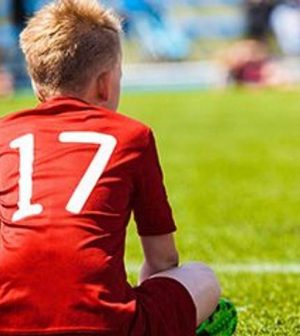- 10 Strategies to Overcome Insomnia
- Could Artificial Sweeteners Be Aging the Brain Faster?
- Techniques for Soothing Your Nervous System
- Does the Water in Your House Smell Funny? Here’s Why
- Can a Daily Dose of Apple Cider Vinegar Actually Aid Weight Loss?
- 6 Health Beverages That Can Actually Spike Your Blood Sugar
- Treatment Options for Social Anxiety Disorder
- Understanding the Connection Between Anxiety and Depression
- How Daily Prunes Can Influence Cholesterol and Inflammation
- When to Take B12 for Better Absorption and Energy
Keep Your Kids Safe From COVID While Playing Sports

COVID-19 shouldn’t keep budding athletes on the sidelines. But it’s critical to keep them safe from the coronavirus while playing sports.
The National Athletic Trainers’ Association has some timely tips.
COVID vaccines for those 12 and older have been a game changer for many families. Being fully vaccinated can make returning to sports safer, the association said.
But for kids too young to get the vaccine yet, it’s important to take steps that lower the risk of spreading the virus.
Remember, too, that kids have who been less active during the pandemic are at risk for injury. Plus, any child or teen who has recently had COVID-19 should have a heart evaluation before returning to physical activity.
Before the sports season starts:
- Understand the safety rules and expectations and talk about them with your child.
- Make sure your children have a face mask, hand sanitizer, towel, water bottle and tissues labeled with their names
- See your doctor if your child needs a pre-participation physical exam.
- If your kids haven’t been active during COVID-19, start easing into exercise. For sports with a lot of running, consider a beginner conditioning program before the season.
Before practice or games:
- Keep your children home from practice or games if they feel sick or have any symptoms of COVID-19.
- Have your children wash their hands before arriving, or use hand sanitizer if soap and water aren’t available.
- Bring labeled personal sports equipment, water bottle, towel, tissues, hand sanitizer and face mask.
- For children not fully vaccinated, wear face masks when arriving or leaving the playing field. Encourage your child to wear a mask in crowded indoor spaces.
- During play, kids should tell a coach if they’re not feeling well and leave practice or game with a parent or caregiver.
Returning to physical activity after COVID-19 infection:
- If your child has a positive COVID-19 test, notify your pediatrician.
- Have children with no symptoms or mild symptoms of COVID-19 screened for heart symptoms. Those with moderate symptoms should not exercise until their symptoms are gone and have had cardiac screening.
- Children who were very sick from COVID-19 must be treated as though they have an inflamed heart muscle (myocarditis). They should not exercise or compete for three to six months. A pediatric cardiologist should examine these children before they are allowed to return to exercise or competition.
- If the sport is outdoors and your child is not fully vaccinated against COVID-19, they should wear face masks when on the sidelines, in the dugout and during team chats.
- Anyone not fully vaccinated should wear a face mask for all indoor sports.
Masks should not be worn during:
- Water sports.
- Gymnastics, cheer stunts and tumbling, and wrestling.
- Exceptions to masks might be appropriate when the risk of heat-related illness is high.
- Unless fully vaccinated, coaches, officials, spectators and volunteers should wear masks. In addition, anyone over 2 who has had close contact with someone who has COVID-19 should wear a mask.
To help protect unvaccinated children, try to avoid:
- Huddles, high-fives, fist bumps and handshakes.
- Sharing food or drink.
- Cheering, chanting, or singing when closer than 6 to 8 feet from others.
- Spitting or blowing nose without a tissue.
- Storing personal equipment less than 6 to 8 feet away from other equipment.
- Sharing equipment as much as possible. (Remember to sanitize hands before and after using balls, bats, sticks and other equipment that must be shared).
After sports practice or games:
- Sanitize or wash hands.
- Wash or replace face masks, towels and practice clothes or uniforms.
- Clean personal equipment and water bottles.
More information
For more on COVID-19 and sports, see the U.S. Centers for Disease Control and Prevention.
SOURCE: National Athletic Trainers’ Association, news release, Sept. 21, 2021
Source: HealthDay
Copyright © 2026 HealthDay. All rights reserved.










